


In a letter to the Joint Parliamentary Committee scrutinising the Waqf (Amendment) Bill, BJP MP Nishikant Dubey has raised concerns over the nearly 1.25 crore feedback submissions, calling for a probe into their sources. He questioned the statistical improbability of such a massive response arising organically from within India, and called for the investigation to cover the possible involvement of fundamentalist organisations, individuals like Zakir Naik, and foreign powers such as the ISI and China. The MP emphasized the need for the probe to preserve the fairness, integrity, and independence of the Waqf Bill deliberations.
A Critical Examination of the Controversial Waqf (Amendment) Bill and Alleged Feedback Manipulation
The Waqf (Amendment) Bill, a contentious piece of legislation, has sparked widespread concerns and allegations of feedback manipulation. In a letter to the Joint Parliamentary Committee overseeing the bill's scrutiny, Bharatiya Janata Party (BJP) MP Nishikant Dubey has questioned the authenticity of the nearly 1.25 crore feedback submissions received.
Background
The Waqf (Amendment) Bill, introduced in 2022, proposes significant changes to the management and regulation of waqf properties in India. It empowers the Central Waqf Council with the authority to acquire, hold, and administer waqf properties, raising concerns among Muslim organizations.
Allegations of Feedback Manipulation
MP Dubey has raised serious concerns about the statistical improbability of such a massive response to the bill's feedback solicitation. He argues that the volume of submissions is disproportionate to the size and demographic profile of India and suggests the possible involvement of organized groups.
Specifically, Dubey has called for an investigation into the potential role of fundamentalist organizations, individuals like controversial Islamic preacher Zakir Naik, and foreign powers such as Pakistan's Inter-Services Intelligence (ISI) and China.
Response from Waqf Board
The Central Waqf Council has rejected the allegations of feedback manipulation, claiming that the responses were genuine and represented the concerns of the Muslim community. The Council has emphasized that the feedback process was transparent and open to all.
Top 5 FAQs and Answers
Q1: What is the key provision of the Waqf (Amendment) Bill? A1: The bill empowers the Central Waqf Council with the authority to acquire, hold, and administer waqf properties.
Q2: Who has raised concerns about the bill? A2: Muslim organizations have expressed concerns about the bill's potential to undermine their autonomy and management of waqf properties.
Q3: What are the allegations against the feedback submissions? A3: MP Nishikant Dubey has alleged that the nearly 1.25 crore submissions are not organic and may have been influenced by organized groups.
Q4: How has the Central Waqf Council responded to the allegations? A4: The Council has denied the allegations and claimed that the feedback process was transparent and genuine.
Q5: What is the current status of the bill? A5: The Joint Parliamentary Committee is examining the bill and is expected to submit its report soon.
Conclusion
The allegations of feedback manipulation surrounding the Waqf (Amendment) Bill have raised serious questions about the integrity of the legislative process. The concerns raised by MP Dubey highlight the need for a thorough investigation to determine the authenticity of the submissions. The outcome of the investigation will have significant implications for the future of waqf management in India and the wider implications for democratic decision-making.

Government officials in the UK are facing backlash from citizens as Storm Bram brings heavy rain and winds, leading to flood warnings and potential risks to life. Good Morning Britain presenters Richard Madeley and Susanna Reid raised concerns about the lack of warning to those living in affected areas, while viewers expressed frustration over inconsistent warning systems. With severe weather conditions expected to continue throughout the country, citizens are calling for better communication and preparation from their government.

A shocking conspiracy was uncovered by the Bihar Police when they arrested an individual from Bhojpur for allegedly issuing death threats to MP Pappu Yadav. The whole scheme was concocted by his close associates to garner enhanced security for Yadav. The arrested man, Ram Babu, has confessed to making a threatening video at the behest of the MP's associates, who had promised him a position in their party. Police are still investigating the instigator of this plot and are also looking into other aspects of the case.

Congress-led UDF emerged as the leading force in the Kerala local body elections, securing a majority in 505 out of 941 Grama Panchayats. Meanwhile, the BJP-led NDA made significant gains, winning the Thiruvananthapuram Corporation for the first time and retaining key municipalities. Union Home Minister Amit Shah credited the victories to PM Narendra Modi's leadership and vision for "Vikasita Keralam".

In a significant victory for the Aam Aadmi Party (AAP), three women candidates secured seats in the Kerala local body elections. Former Mayor and MCD AAP Councillor Dr. Shelly Oberoi congratulated the winners, praising their success as a strong example of women's empowerment. Meanwhile, Congress president Mallikarjun Kharge expressed his gratitude to the people of Kerala for giving a decisive verdict in favor of the United Democratic Front (UDF), while Prime Minister Narendra Modi acknowledged and praised the efforts of BJP workers in the state. This outcome reflects the increasing support for female leaders and potentially hints at a greater shift towards progressive politics in the state.

As the counting for the local body elections in Kerala began, the Congress-led UDF is in the lead in most of the city and town local bodies. This two-phase election, held on December 9 and 11, has seen a high voter turnout of over 70%. The results of this election will have a significant impact on the political landscape ahead of the 2026 Assembly elections in Kerala, with local body results often reflecting voter mood. Congress president Mallikarjun Kharge has expressed confidence in the UDF alliance's chances in the upcoming Assembly polls.

R Sreelekha, the former DGP and BJP's mayoral candidate in Thiruvananthapuram Corporation, secured a victory in the Sasthamangalam ward and pledges to deliver a corruption-free administration if given the chance to serve the public. Other notable victories in the corporation elections include former district president VV Rajesh and UDF mayoral candidate KS Sabarinathan. However, some high-profile defeats were seen, including actor Poojapura Radhakrishnan and Congress leader Johnson Joseph. Independent candidate Pattoor Radhakrishnan and Congress candidate Mary Pushpam also emerged victoriously in their respective wards.

According to sources, the Special Intensive Revision (SIR) exercise in West Bengal has identified a total of 58,80,202 voters who may be excluded from the draft voter list. This includes people who have passed away, transferred, missing, and identified as 'fake' by the Election Commission. These numbers are subject to change in the final list, which is set to be published on February 14, 2022. The commission has divided voters into three categories - own mapping, progeny mapping, and non-mapping - depending on their presence in the 2002 voter list. Those not falling into any of these categories will be called for a hearing by the EC.

In a significant shift in voter sentiment, the Congress-led United Democratic Front (UDF) is set for a decisive win in the Kerala local body elections, dealing a major setback to the ruling CPM-led Left Democratic Front (LDF) ahead of the 2026 Assembly elections. The UDF has consolidated its gains across urban local bodies, while the LDF's last-minute welfare push failed to curb anti-incumbency. The NDA also made significant gains, underlining its expanding presence in urban Kerala.

In a major upset, the BJP-led NDA has won the Thiruvananthapuram Municipal Corporation, ending the CPI(M)-led LDF's 45-year reign. The victory, with the NDA winning 50 out of 101 seats, is a boost for BJP's aspirations in Kerala's upcoming Assembly elections. The party's strong focus on development and Hindutva in Thiruvananthapuram, under the leadership of state unit president Rajeev Chandrasekhar, proved successful despite challenges faced during the campaigning. This victory has put the BJP in a strong position for the 2021 Assembly elections.

The Bharatiya Janata Party-led National Democratic Alliance (NDA) has taken a huge lead in Thiruvananthapuram Municipal Corporation, giving a setback to the ruling Left Democratic Front (LDF). Initial trends show the NDA leading in 25 wards, while the LDF is ahead in 15 wards and the UDF in 10 wards. This is a major blow to the LDF ahead of the upcoming assembly elections in Kerala, with a record voter turnout of 73.69%. The State Election Commission has also commended the peaceful conduct of the elections.